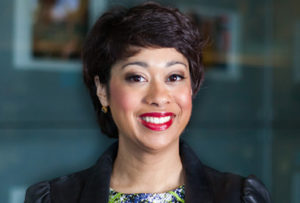
Social media and our ever-evolving digital landscape have a significant impact on the way we receive and share news. Last year, over 67% of U.S. adults reported getting at least some of their news on social media. Twitter is the most popular platform for users seeking their news on social media and has become a major channel for social and political movements.
This shift in the way we perceive news has also revolutionized the way journalists investigate their stories. Every person who documents an event with their smartphone becomes a source. In the information age, how does a journalist verify what they see on social media? What are the pros and cons of citizen journalists? What does the future of journalism look like?
These are all topics that the Investigative Journalism in the Social Media Age panel seeks to discuss at South By Southwest this year. In anticipation of the panel, we sat down with Newseum Manager of PR Sonya Gavankar.
Sonya was originally inspired to study journalism because she had hopes of becoming a war correspondent.
“I have taken a very non-traditional route in my career. I do have a broadcast journalism degree and I studied journalism in hopes of becoming a war correspondent. I was inspired by the first Gulf War and the coverage because there were so few women reporting from the field back in the day,” said Gavankar.
However, her career did not begin in journalism. After graduating from school, Sonya started working in tech.
“I started working at CNN in a technical capacity and that eventually brought me to the newseum where I’ve produced the films in our exhibits for years. I still freelance as a journalist in a spokesperson capacity now. Now I do the PR for the newseum. It was a very non-traditional route, but now I get to tell the stories of journalists and interview them.”
Sonya shared that she often uses social media as a source when reporting and she emphasized the importance of having a diverse pool of sources.
“It’s important to have your gut instinct and your spidey senses, but you also kind of see what’s happening on social media. It’s really important to be looking at so many different types of sources. It doesn’t help you to know what the real folks in the world are thinking if you’re only listening to the echo chamber that agrees with you.”
When asked how she thinks our evolving digital world will affect the future of investigative journalism, Sonya said that it’s impossible to know exactly what to expect.
“It will affect it in ways we can’t even imagine. If you think about it we’re in the first digital age. The technology has only been around for a short amount of time. So, we don’t really know what the future holds. We don’t know the good, the bad, or the ugly yet.”
Hear more from Sonya and her co-panelist Washington Post Reporter David Fahrenthold during the Investigative Journalism in the Social Media Age panel at SXSW.
Sunday, March 11
3:30PM – 4:30PM
JW Marriot – Salon H
Find out more: Investigative Journalism in the Social Media Age
Featured image: SXSW
